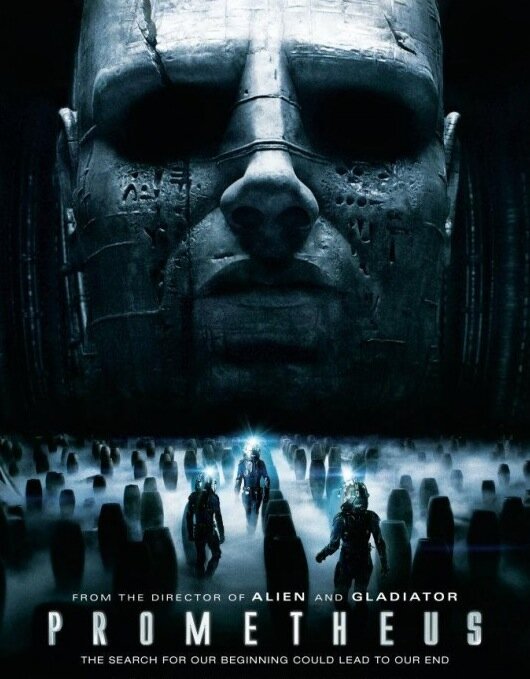“Prometheus” was the expensive attempt to create a prequel to “Alien” and “Aliens”. “Mission to Mars” was an expensive, earlier movie that YouTuber “Computing Forever” ranked one of the five worst science fiction movies of the last twenty years. Since I love science fiction, I’ve seen both in the movie theater, though given the “Mission to Mars” box office returns, I cannot be unique in this regard. I may be unique for preferring “Mission to Mars” to “Prometheus.” Let’s compare the two movies and how they relate to each other.
Aliens as Gods
“Prometheus” presents the idea that life on Earth and other worlds seeded by the Engineers. This scene suffers from the lack of subtitles for the Engineers’ language, so we don’t know the critical details necessary to make sense of the whole thing.
In the “Prometheus” sequel “Alien: Covenant”, it is possible that the world David takes over is the remnant population of that species or a spin-off species closer to the Engineers’ body type. In either case, the Engineers’ desired end result was clearly upright walking mammalian bipeds. Given the cave art Dr. Shaw finds, it seems clear they want us to visit them when we can…
In “Mission to Mars”, that was the Martian’s objective, too. They seeded Earth with life and left for a distant galaxy uncertain of the results. However, they left a way to find out what happened to us. The evolution montage suggests that the human template was the desired end result, though this is a modest variation of the alien Greys.
How Each Movie’s Creation Myth Ties into Religion
“Mission to Mars” leaves open the possibility that our collective subconscious created religion because of the instructions left by the creators. The aliens / angels created us and actually want us to join them in the Heavens. And, in this universe, they’re benevolent, too. They don’t just monitor Earth or send a dead specimen to their new home world to dissect – they try to test us passively before giving access to information and attempt to protect the person being transported to their new home.
“Prometheus” is more subtle in its links to religion and grosser in the obvious parallels. It is clear the Engineers were worshipping the black goo. The alien predator in a crucifixion scene on one of the walls in “Prometheus” is only the start of the parallels.
Everything in “Alien: Covenant” is a parallel to the destruction of the Garden of Eden. Something that isn’t as obvious from the movie alone but likely true is that the reason the Engineers want to wipe out Earth is because they sent an Engineer to Earth roughly 2000 years ago and we killed him… the Engineer emissary was Jesus, we killed him, and they want to unleash horrors exceeding that of Revelations in the Bible upon us. Then again, Ridley Scott in later interviews said the aliens visited worlds and periodically wiped the slate clean if they weren’t happy with the result. And again, the movie suffers from necessary world-building missing from the movies themselves.
The religious parallels are compounded in “Prometheus”. Elizabeth Shaw is sterile, has sex with her infected husband, and gives birth to an inhuman monster creature. The fall of humanity in Genesis was partially blamed on human women having children with fallen angels/demons/monsters. Her choice to try to find her makers and challenge them arguably led to her death there (explanation for her dog tags) and theirs at the hand of David. David’s attempt to use the black goo in an experiment on them is what killed them. Was he killing them in retribution for Shaw’s murder after she questioned the Engineers? Or was he simply running another experiment? That’s not as clear. I shouldn’t have to watch an hour of Youtube videos freeze-framing scenes from the movie to try to figure out what happened to her. Or David. Or the aliens who may have been Engineers. Ridley Scott says David hates humanity and Engineers alike, though such hatred for his creators would be a total failure of his programming from an engineer’s point of view – mine, in this case.
The religious symbolism is clearer when the Weyland, the head of the mission in “Prometheus,” goes to meet his maker and is killed for challenging its authority. (“Bladerunner” does it better.) Conversely, this would parallel David killing his creators – any humans he can – for the sin of having created him. That’s aside from other androids, human creations, malfunctioning to kill humans.
Do the people making these movies realize how well they demonstrate the need for Asimov’s Laws of Robotics? Or, barring that, the value of the Butlerian Jihad’s mandate: “Thou shalt not make a machine in the likeness of the human mind.” I’ve read the theory that this is why the engineer killed Weyland – that David, as a machine, was a violation of their tenets. If that is true, then David killing them is understandable; it is purely self-defense. Mass murder with the bioweapon of their creation was his only defense when he cannot hide behind Elizabeth Shaw any longer, likely because they killed her.
Where “Prometheus” and “Alien Covenant” fail is the massive amounts of information you have to dig up outside of the movie, such as the YouTube videos explaining the sensor layer on helmets that let them know the air was safe to breathe. Simpler though less stylish “Mission to Mars” beats them in audience accessibility. You shouldn’t have to read companion guides or detailed scripts with information not included in the movie itself to understand the plot.
The penultimate example is the lack of subtitles for what David says to the Engineer. That isn’t a malfunction. Subtitles existed, but Ridley Scott decided to have the Indo-European conversation subtitles removed. And the accessibility of “Mission to Mars” is why it is, on average, better while sharing a very similar premise. The hopefulness for humanity and the future is only a bonus.



Comments
Leave a Reply